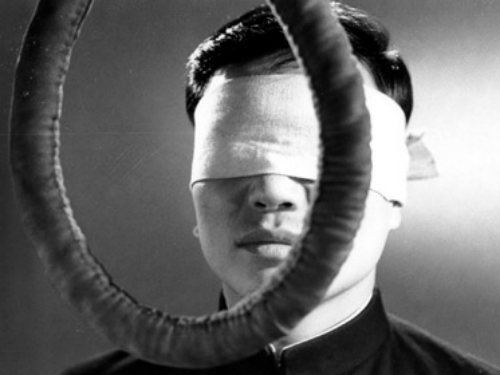
“Rather than being our own, the labors of our days are merely a series of things we are made to do by those outside ourselves. We live lives that are even more evanescent than the bubbles floating along the stream – and even more meaningless. The reason we show an abnormal interest in crime and scandal is that a life, which usually drifts by, thereby appears caught up by a pole in the river’s flow. A drowning man grasps at straws. For we find, in crime and scandal, a tiny trace that reminds us of human dignity.”
Nagisa Ôshima
“‘I must cultivate this painful bitterness and make it explode,’ wrote Nagisa Ôshima (1932–2013) in 1965. And so he did. The filmmaker who would later gain worldwide fame with films such as Ai no Korīda [In the Realm of the Senses] and Merry Christmas Mr. Lawrence, witnessed with great disquiet how postwar Japan, under the guise of nationalism and conformism, rendered itself increasingly guilty of imperialism and racism. His boundless outrage resulted in a series of fiery cinematographic accusations, in which he mercilessly dispensed with the hypocrisy of the Japanese ‘police state’. The eternal recalcitrant hardly found support or congeniality within the bastion of his native cinema – which he despised – but it didn’t take long before he was taken in by the movements that were emerging in the European film landscape. No wonder Ôshima was called the ‘Japanese Godard’ (a platitude he wittily countered by calling Godard “the French Ôshima”) and his films were catagorized as part of the Japanese ‘New Wave’ (a label he obviously rejected). However, he himself rather found inspiration in the Japanese underground theatre (‘Ungura’), which tried to reconcile the politically engaged ideas of Vsevolod Meyerhold and Bertold Brecht with premodern Japanese traditions. The majority of Ôshima’s films from the 1960s are the result of his efforts to translate the characteristic game with constrained space and dynamics between language and form, to cinema. Of these films Kôshikei [Death By Hanging] is undoubtedly his most ‘Brechtian’ work, not only by implicitly refering to the Threepenny Opera, but also in making extensive use of ‘Verfremdung’ techniques. Not for nothing this radical and complex indictment of the Japanese legal system, based on the so-called ‘Komatsukawa incident’, was called ‘the most fantastic scenario in the history of cinema’ by Luc Moullet. Ôshima described the stakes of the film as follows: ‘As long as the state makes the absolutely evil crime of murder legal through the waging of wars and the exercise of capital punishment, we are all innocent.’”
Stoffel Debuysere1
- 1Figures of Dissent: Nagisa Oshima, on the occasion of Courtisane’s screening of the film in 2013, within the framework of the research project Figures of Dissent.

